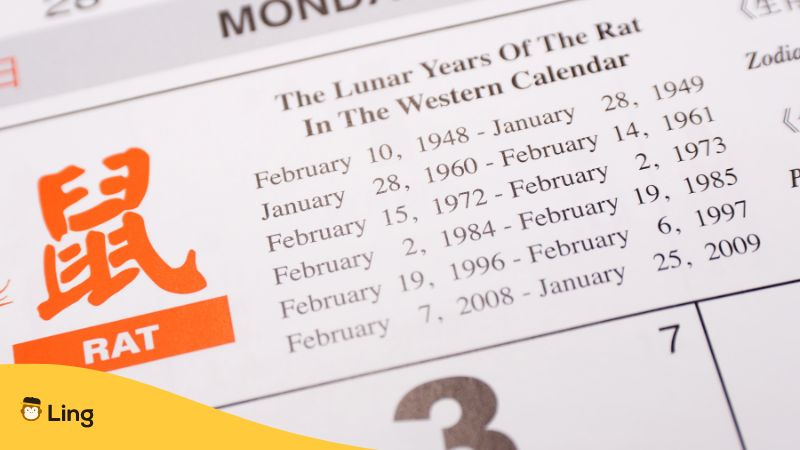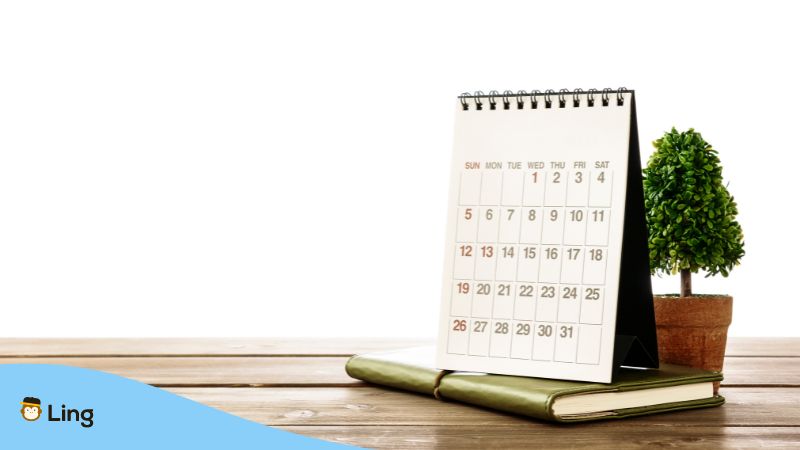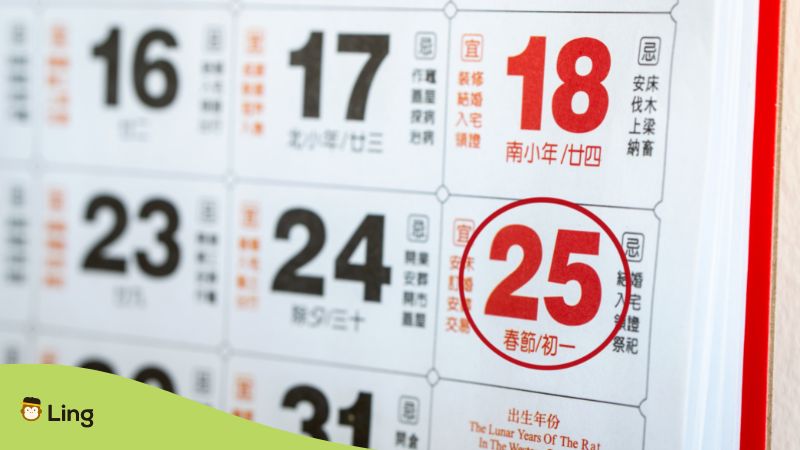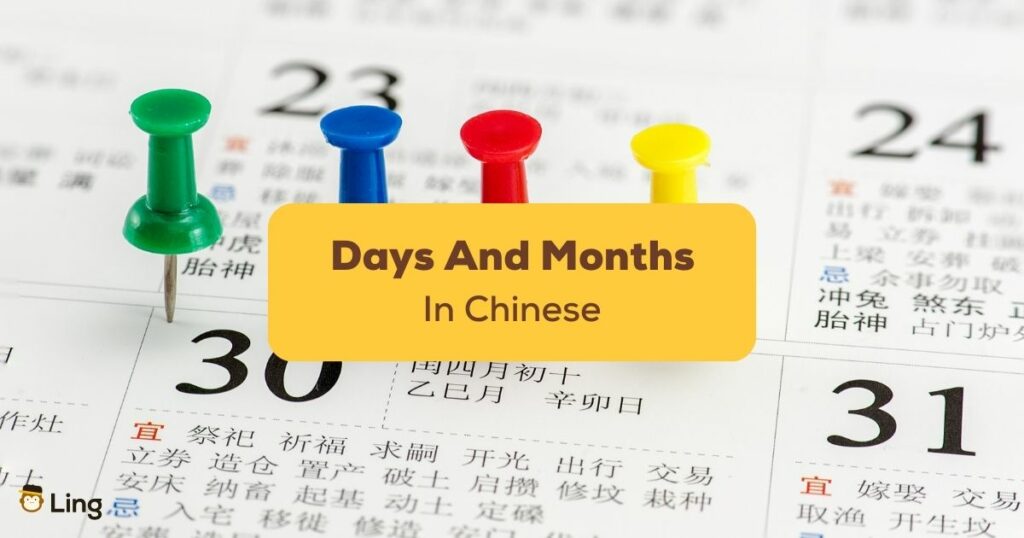From the vibrant celebrations of the Lunar New Year to the mouth-watering feasts of the Mid-Autumn Festival, Chinese culture is rich with unique traditions and customs that revolve around the Chinese days and months of the year. And if you’re serious about learning Chinese, understanding the terminologies related to days and months is essential. So buckle up and prepare for a fun and engaging journey through the Chinese calendar. We’ll explore the basics of this topic and how to write particular dates in Chinese characters!
Let’s be real here, learning Chinese words for days and months is a fantastic way to expand your language skills and deepen your understanding of Chinese culture. Knowing the terms will allow you to read and write dates, understand the religious lunar calendar, and communicate with Chinese speakers more effectively. It will also give you a glimpse into China’s rich history and traditions. So if you’re still a beginner, we highly recommend focusing on this topic first. To help you get started, keep reading the sections below!
The Basics Of The Chinese Calendar
The Chinese lunar calendar is one of the oldest calendars in the world, dating back to around 2600 BC. It was created by a people known as the Shang Dynasty, who ruled over northern China from 1766 to 1122 BC. The Chinese calendar has been used continuously since then and has changed very little over time.
The Chinese calendar is a lunisolar calendar, which uses solar and lunar cycles to determine when holidays and other celebrations will fall. There are 12 months in the Chinese calendar, each spanning between 30 and 31 days, depending on the year.

Chinese Months Of The Year
As you may know, the Chinese calendar is based on the lunar cycle and has been used for over 4,000 years. Each month has its unique significance and customs, so let’s dive in and learn more about each month and its translation in Chinese characters!
January – 一月 (Yī Yuè)
As the first month of the year, January is often associated with new beginnings and fresh starts. In China, it is also the time for the Spring Festival or Chinese New Year, the most important holiday of the year. During this time, families gather to share delicious meals and exchange red envelopes filled with money.
Fun fact: The Chinese New Year usually falls in January or February, depending on the lunar calendar.
February – 二月 (Èr Yuè)
February is a month of love and romance in the Western world, with Valentine’s Day falling on the 14th. In China, it is a time for the Lantern Festival, which marks the end of the Chinese New Year celebrations. People light colorful lanterns and enjoy sweet glutinous rice dumplings.
Fun fact: Red is considered lucky in Chinese culture, and you’ll see it everywhere during the New Year celebrations.
March – 三月 (Sān Yuè)
In China, March is associated with the arrival of spring and the blooming of flowers. The plum blossom is particularly significant during this month and is often used as a symbol of perseverance and resilience.
April – 四月 (Sì Yuè)
April is the month of the Qingming Festival, also known as Tomb Sweeping Day. It is a time for families to visit the graves of their ancestors and pay their respects. It is also a time for spring outings and enjoying the beautiful weather.
May – 五月 (Wǔ Yuè)
May is a month of celebration in China, with both Labor Day and Youth Day falling within is also the month of the Dragon Boat Festival, where people race dragon boats and eat delicious rice dumplings wrapped in bamboo leaves.
June – 六月 (Liù Yuè)
June is the beginning of summer in China, a time for outdoor activities like hiking and swimming. June 1st is Children’s Day, a day for children to have fun and be celebrated.
July – 七月 (Qī Yuè)
July is the month of heat and humidity, with temperatures reaching their peak. In China, the Qixi Festival, also known as the Chinese Valentine’s Day, is celebrated on the seventh day of the seventh lunar month.
August – 八月 (Bā Yuè)
August is the month of the Ghost Festival, where people honor and appease their ancestors and ghosts by offering food and burning incense. August 1st is also Army Day in China, honoring soldiers and veterans.
September – 九月 (Jiǔ Yuè)
September marks the beginning of autumn and the harvest season. In China, it is also the month of the Mid-Autumn Festival where families gather to enjoy mooncakes and admire the full moon.
October – 十月 (Shí Yuè)
October is a month of cool temperatures and changing leaves in China. It is also the time for Double Ninth Festival, where people climb mountains and drink chrysanthemum wine to celebrate longevity.
November – 十一月 (Shí Yī Yuè)
November is a transition month as the temperatures continue to drop and winter approaches. In China, it is also the month of Singles’ Day, which has become the world’s biggest online shopping event.
December – 十二月 (Shí Er Yuè)
December is the month of holidays and festivities, with Christmas and Hanukkah celebrated worldwide. In China, the Winter Solstice is celebrated during the twelfth month with family gatherings and traditional foods.

Chinese Days Of The Week
In Chinese, there are three different ways to say “week,” each with unique nuances. Here are three different ways of saying the days of the week in Chinese that you must know:
星期 (Xīng Qī)
This is the most commonly used way of saying the days of the week in Chinese. 星期 means “star period.” It refers to the seven-day cycle based on the stars’ movement. As a note, please remember that this term is also commonly used in spoken Chinese.
- Monday – 星期一 (xīng qī yī)
- Tuesday – 星期二 (xīng qī èr)
- Wednesday – 星期三 (xīng qī sān)
- Thursday – 星期四 (xīng qī sì)
- Friday – 星期五 (xīng qī wǔ)
- Saturday – 星期六 (xīng qī liù)
- Sunday – 星期日 / 星期天 (xīng qī rì / xīng qī tiān)
周 (Zhōu)
Another way of saying the days of the week is by using the Chinese word 周 (zhōu). This is a more formal way of saying it. Moreover, it is used in a formal context, such as business meetings, formal conversations, and speeches. Here’s how to tell the days of the week using 周:
- Monday – 周一 (zhōu yī)
- Tuesday – 周二 (zhōu èr)
- Wednesday – 周三 (zhu sān)
- Thursday – 周四 (zhōu sì)
- Friday – 周五 (zhōu wǔ)
- Saturday – 周六 (zhōu liù)
- Sunday – 周日 / 周天 (zhōu rì / zhōu tiān)
礼拜 (Lǐbài)
The third way of saying the days of the week in Chinese is by using the word 礼拜 (lǐbài). This is a more colloquial way of saying it. Here’s how to tell the days of the week using 礼拜:
- Monday – 礼拜一 (lǐbài yī)
- Tuesday – 礼拜二 (lǐbài èr)
- Wednesday – 礼拜三 (lǐbài sān)
- Thursday – 礼拜四 (lǐbài sì)
- Friday – 礼拜五 (lǐbài wǔ)
- Saturday – 礼拜六 (lǐbài liù)
- Sunday – 礼拜日 / 礼拜天 (lǐbài rì / lǐbài tiān)

How To Write Dates In Chinese
Knowing how to write dates is essential to your language journey if you’re learning Chinese. Writing dates in Chinese is slightly different from writing them in English, but it’s not too tricky once you get the hang of it.
The format for writing dates in Chinese is the year, month, and day. To write the specific date, you’ll use the formula “年 (nián) + 月 (yuè) + 日 (rì).” Here’s an example:
- 2022年8月12日
Now that you know how to write Chinese dates, you can practice writing out the dates of critical future events in your life or Chinese history. With a bit of practice, you’ll be able to write dates in Chinese with ease!
Use The Chinese Days And Months Like A Pro
Mastering the days and months in Chinese is an essential milestone for anyone learning the language. Whether you’re a beginner or an advanced learner, understanding the terminologies we covered above is essential for communication, cultural understanding, and even travel.
Keep practicing, and you can confidently use Chinese dates and months daily. Remember, learning a new language takes time and effort, but the rewards are immeasurable. If you want to learn more about the Chinese language, check out the Ling app!
Learn Chinese With Ling
Are you ready to take your language skills to the next level? Look no further than the Ling app! With our cutting-edge technology and personalized learning approach, you’ll speak like a native in no time. The app offers a wide variety of courses, from beginner to advanced levels, in more than 60 languages. With interactive lessons, fun quizzes, and engaging content, you’ll stay motivated and excited to learn every step of the way. So why wait? Start your language-learning journey today!
Download the app on the App Store and Play Store now!


































































